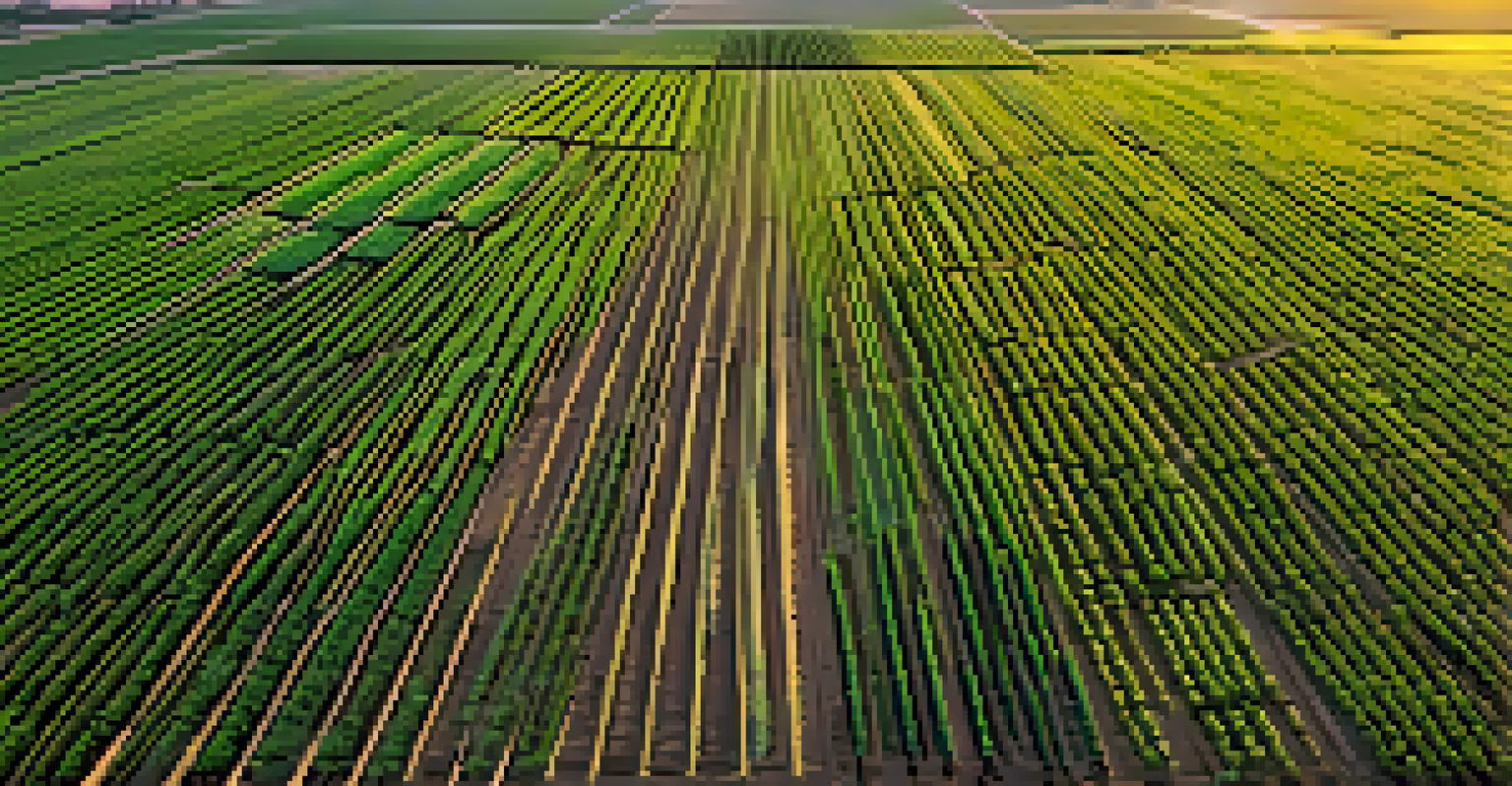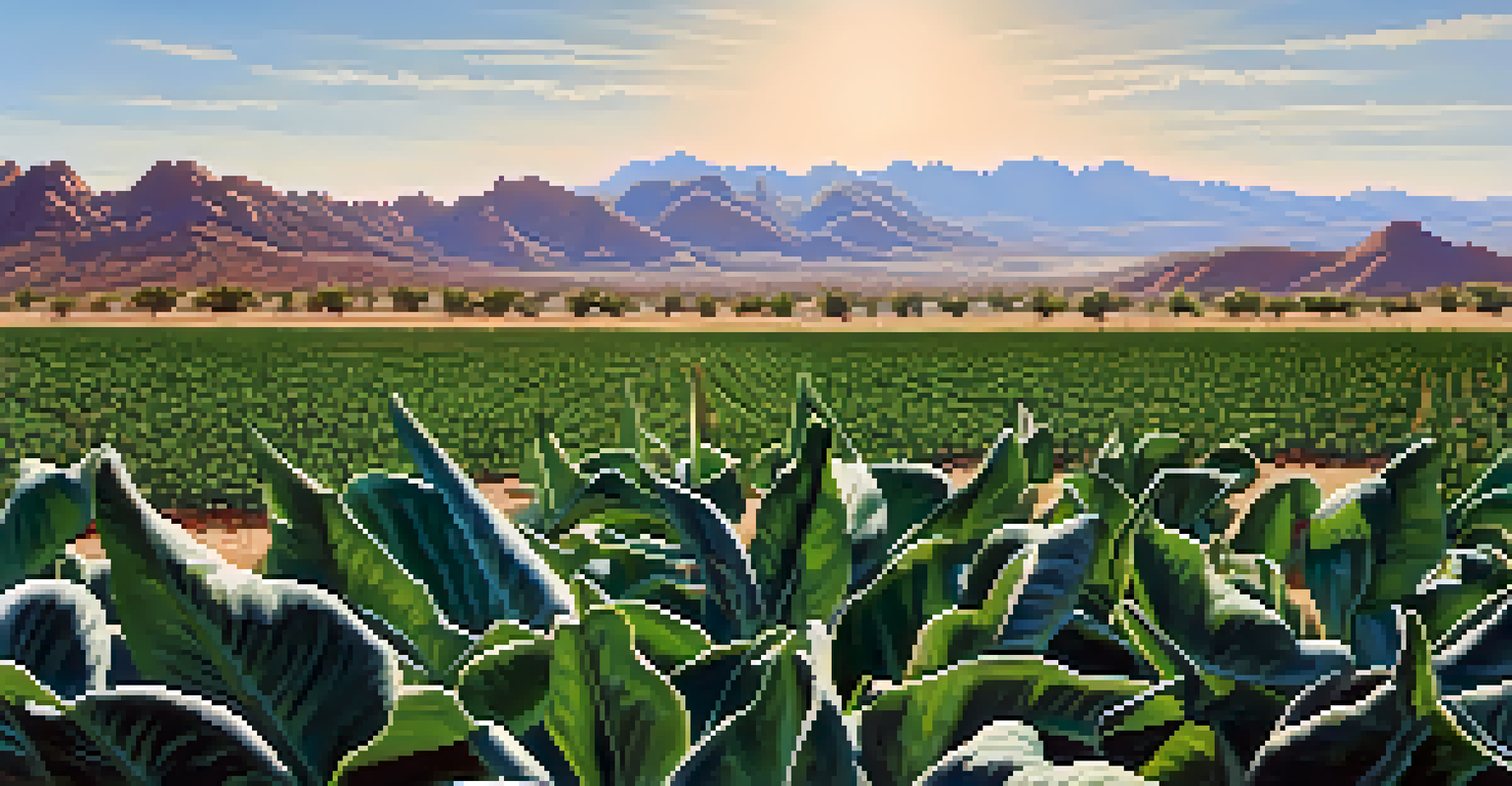Exploring Arizona's Sustainable Water Management in Agriculture

Understanding Arizona's Water Scarcity Challenges
Arizona is known for its stunning deserts and beautiful landscapes, but it also faces significant water scarcity challenges. With an arid climate and limited freshwater resources, the state must find innovative ways to manage its water supply, especially in agriculture. This makes understanding the region's water situation critical for both farmers and policymakers alike.
Water is the driving force of all nature.
The state relies heavily on groundwater and the Colorado River for irrigation, which can lead to depletion and environmental stress. As the population grows and climate change intensifies, the pressure on these water sources increases. Therefore, sustainable practices are not just beneficial; they are essential for the longevity of agriculture in Arizona.
The urgency of the situation has prompted farmers, researchers, and government officials to collaborate on sustainable water management strategies. These efforts aim to balance agricultural needs with the preservation of vital water resources, ensuring that future generations can continue to thrive in this unique environment.
Innovative Irrigation Techniques in Arizona
One of the most effective ways Arizona farmers are addressing water scarcity is through innovative irrigation techniques. Drip irrigation, for example, delivers water directly to the plant's roots, minimizing evaporation and runoff. This method has proven to be a game-changer in maximizing water efficiency while maintaining crop yields.

Another technique gaining traction is soil moisture sensors, which help farmers determine the optimal time to irrigate. By using this technology, farmers can avoid over-watering and ensure that they only use the necessary amount of water. This not only conserves water but also promotes healthier crops.
Water Scarcity Demands Innovation
Arizona's water scarcity challenges necessitate innovative solutions in agriculture to ensure sustainable water management.
Moreover, farmers are increasingly adopting rainwater harvesting systems to supplement their water supply. By capturing and storing rainwater, they can reduce their reliance on traditional water sources and create a more sustainable farming model. These techniques illustrate that innovation is at the core of Arizona's agricultural water management.
The Role of Crop Selection in Water Conservation
In Arizona, crop selection plays a crucial role in sustainable water management. Farmers are increasingly choosing drought-resistant crops that require less water, such as sorghum and certain varieties of beans. This shift not only conserves water but also enhances food security in an unpredictable climate.
We do not inherit the earth from our ancestors; we borrow it from our children.
Additionally, the state is seeing a rise in the cultivation of native plants and crops that are better adapted to the local environment. By focusing on these resilient crops, farmers can ensure higher survival rates and yield while using less water. This practice also helps in maintaining biodiversity and protecting local ecosystems.
Through education and research, agricultural extensions are empowering farmers to make informed decisions about crop choices. This collaborative approach helps to create a resilient agricultural sector that can withstand the challenges posed by climate change and water scarcity.
The Importance of Community Collaboration and Education
Community collaboration is vital in addressing Arizona's water management issues. Local farmers, researchers, and educational institutions are forming partnerships to share knowledge and resources. These collaborations foster a sense of unity and encourage collective problem-solving.
Education plays a significant role in this effort. Programs that teach sustainable farming practices and water conservation techniques are essential for equipping farmers with the tools they need. Workshops, seminars, and field days enable farmers to learn from one another and stay updated on the latest innovations.
Tech Advances Enhance Water Efficiency
The integration of technology, such as soil moisture sensors and mobile apps, is transforming how Arizona farmers manage water resources.
By investing in community education and collaboration, Arizona is fostering a culture of sustainability. As farmers become more knowledgeable and connected, they are better equipped to implement practices that conserve water and protect the environment for future generations.
Technological Advancements Supporting Water Management
The integration of technology has revolutionized water management in Arizona's agriculture. Advanced data analytics, satellite imagery, and drone technology are enabling farmers to monitor water usage and crop health like never before. These tools provide valuable insights that help optimize irrigation schedules and reduce water waste.
Moreover, mobile applications are making it easier for farmers to access real-time data about weather conditions and soil moisture levels. This instant access to information allows them to make informed decisions on when and how much to irrigate, ensuring that every drop counts.
As technology continues to evolve, the potential for enhancing sustainable water management practices in agriculture grows. Embracing these advancements not only benefits farmers but also contributes to the overall health of Arizona's water resources.
Policies and Regulations Promoting Sustainable Practices
Arizona's government has recognized the importance of sustainable water management and is implementing policies and regulations to support these efforts. Programs that incentivize farmers to adopt water-efficient practices, such as grants for irrigation upgrades, are becoming more common. These initiatives encourage farmers to invest in sustainable technologies that conserve water.
In addition, state regulations are being developed to ensure that water usage is monitored and managed effectively. By establishing limits and promoting conservation, these policies aim to protect the state's water resources for future generations. Collaboration between government and agriculture stakeholders is essential for the success of these initiatives.
Collaboration Fuels Sustainable Practices
Community collaboration and education are essential for empowering farmers to adopt sustainable water conservation techniques.
As policies evolve, they have the potential to create a more sustainable agricultural sector in Arizona. By aligning regulations with the needs of farmers, the state can foster an environment where sustainable practices thrive.
The Future of Sustainable Agriculture in Arizona
The future of sustainable agriculture in Arizona looks promising, thanks to the collective efforts of farmers, researchers, and policymakers. As awareness of water scarcity issues grows, so does the commitment to finding innovative solutions. This collaborative spirit is essential for building a resilient agricultural sector.
As technology continues to advance, the potential for improved water management practices will only increase. From precision agriculture to sustainable irrigation techniques, the tools available to farmers will empower them to use water more efficiently. This evolution will be crucial in adapting to the challenges posed by climate change.

Ultimately, the focus on sustainable water management in agriculture will benefit not only farmers but also the wider community and ecosystem. By prioritizing water conservation, Arizona can ensure a sustainable future for its agriculture, economy, and environment.